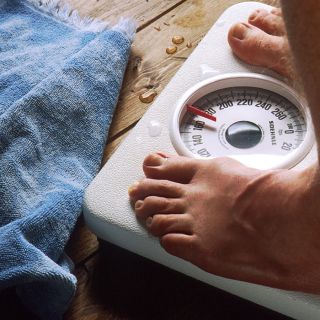Motivation
Daily Weighing May Help Manage Your Weight
Weighing yourself every day may be a good idea after all.
Posted December 23, 2013

Conventional wisdom says to weigh yourself once a week, if you’re trying to lose weight. Yet it might be time to rethink that advice. New research suggests that weighing every day as part of an overall healthy lifestyle may be more effective.
Jessica LaRose, PhD, an assistant professor of social and behavioral health at VCU School of Medicine, headed up a recent study of the effects of daily weighing during weight loss. The study included 178 overweight or obese adults, who were randomly assigned to one of two reduced-calorie diets. Both groups aimed for at least 200 minutes per week of moderate physical activity. Plus, both groups were asked to get on the scale at home every day.
Over the 18-month study, some people were more diligent about daily weighing than others. Those who weighed every day lost more weight, on average, than those who didn’t. One concern in the past has been that getting on the scale so often might lead to unhealthy obsessing over weight. The study offered some reassurance on that count. Researchers found no evidence of an increase in disordered eating among those who checked their weight daily.
Recently, I had a chance to ask Dr. LaRose a few questions about her research. Here’s what she told me.
What are the benefits of daily weighing for shedding pounds and keeping them off?
Dr. LaRose: A number of studies and review articles have demonstrated that daily self-weighing is associated with better long-term management of weight, relative to less frequent weighing. These data are consistent with findings that other forms of self-monitoring, such as keeping a food diary, are associated with better weight loss outcomes. They speak to the importance of awareness about how one’s behaviors are influencing weight.
Stepping on the scale each day provides immediate and concrete information about how eating and activity behaviors impact your weight. It cues you to make changes as needed to stay on track with your goals. Daily self-weighing is not magic, however. The key is to use the information from the scale to make changes in your eating and activity.
What are the limitations of your study?
Dr. LaRose: In our study, we have a bit of a chicken-or-egg problem: Since participants were not randomized to weigh daily or not, we cannot speak to causality. That is, our data cannot tell us whether people lost less weight because they weighed less frequently, or, rather, if those who were losing less weight were less motivated to continue weighing.
However, another recent study demonstrated that a daily self-weighing intervention produced clinically significant weight loss. Previous studies have also demonstrated the benefits of daily self-weighing for weight maintenance, both in the primary prevention of weight gain and in the prevention of weight regain following weight loss.
How do you explain the benefits of daily weighing?
Dr. LaRose: Daily self-weighing can be conceptualized within the framework of Kanfer’s theory of self-regulation. The basic idea of self-regulation is to look at a piece of information, see how the information compares to a goal, and then take specific action based on that comparison. With daily self-weighing, individuals can react with appropriate self-reinforcement if they are on target with their goals. And they can enact behavior changes to reverse small weight gains that are inconsistent with their goals.
Regular feedback from the scale gives individuals a sense of personal accountability and continued awareness. It is not unlike someone with diabetes checking her blood sugar daily. The number from the glucometer provides feedback, which an individual can use to guide her future choices.
Are there some people who should not weigh daily?
Dr. LaRose: Research has shown that, in general, individuals who are asked to weigh daily as part of a lifestyle program like it and find it to be a valuable tool. Moreover, in our study, daily self-weighing did not appear to have a negative impact on disordered eating symptoms, even though individuals with a history of disordered eating were not excluded from participating. This is encouraging. It suggests that daily self-weighing may be a tool that can be recommended broadly.
We generally promote daily self-weighing within the context of a lifestyle intervention, in which we teach individuals to view their weight not as “good” or “bad,” but rather as information. We encourage them to remove the personal judgment from the number on a scale and regard it as just a number that they can use to see if they are on target with their goals.
That said, whether or not to self-weigh every day is an individual choice. Someone who is not comfortable with the idea or who believes it may lead them to think about their weight in an unhealthy way should consider alternative methods of self-monitoring.
Daily weighing would not be a good idea for someone who is currently undergoing treatment for or displaying symptoms consistent with disordered eating—for example, fasting, skipping meals, vomiting, or abusing laxatives. Also, data on the benefits of daily self-weighing are primarily drawn from adult populations. We would not advise it for children or adolescents.
If someone wants to try daily weighing as part of a weight loss plan, do you have any tips on how to do it most effectively?
Dr. LaRose: For the most accurate and meaningful results, weigh first thing in the morning, without clothes and after urinating. Use the same scale every day. Keep the scale on a hard surface; avoid moving it or placing it on carpet.
Consider recording your weight. Many free apps are available that allow you to track your weight and provide a visual graph of your progress. This can be great for keeping an eye on trends over time, such as a tendency to bump up on the weekends.
Linda Wasmer Andrews is a writer who specializes in health, psychology, and the intersection between the two. Follow her on Twitter or Facebook.




